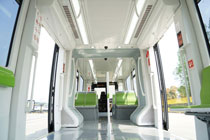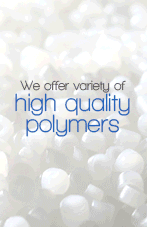
In many countries, rail passenger transport is increasing. Rail vehicles require less energy per passenger than cars, trucks and planes, emit less CO2 and help prevent road congestion. They also offer a high level of comfort. It therefore comes as no surprise that the rail networks in a number of countries are being further expanded, and the demand for modern rail vehicles is growing. One such company that is helping meet the requirements with its polycarbonate (PC) plastic is Bayer MaterialScience.
One example is the new Line 1 subway in the Chinese development zone of Souzhou. China South Railway, China’s leading public transport manufacturer, is using Bayblend and Makrolon PC sheets for the interior of the subway cars. The flame-retardant products not only ensure passenger safety, they are also lightweight and robust. The two companies collaborated closely during all phases of the project - from material selection all the way through to manufacture. Bayer also helped its Chinese partner optimise the production processes.
"We are working with a large number of other customers besides China South Railway to develop tailored solutions for typical rail applications," said Wim van Eynde, who manages a global project for rail transportation at Bayer MaterialScience. "As a result of these contacts with partners along the entire rail value-added chain, we have gained extensive knowledge of global market requirements. This also enables us to meet special country-specific specifications and requests."
PC granules and sheets from Bayer are robust and can even stand up to vandalism. Their flame retardance meets the requirements of the new EN 45545-2 European fire protection standard for many applications, and the use of these products ensures a high level of safety for passengers. Design freedom is another benefit, with virtually no restrictions in terms of shaping, colour selection or surface structure. This benefits rail operators looking to give their rail vehicles a distinctive appearance. The plastic components are available in a variety of reproducible colours and retain their dimensional stability over a wide temperature range. Their light weight helps reduce both fuel consumption and CO2 emissions.
Furthermore, Bayer says it uses eco-friendly and efficient extrusion technologies to manufacture the PC sheets, thus minimising emissions and other environmental effects. The manufacturing processes also boosts productivity thanks to the shorter cycle times. The products are durable and can be recycled on reaching the end of their useful lives.
With 2013 sales of EUR11.2 billion, Germany-headquartered Bayer MaterialScience is among the world’s largest polymer companies. Business activities are focused on the automotive, electrical and electronics, construction and the sports and leisure industries. At the end of 2013, Bayer MaterialScience had 30 production sites and employed approximately 14,300 people around the globe. Bayer MaterialScience is a Bayer Group company.
(PRA)






















